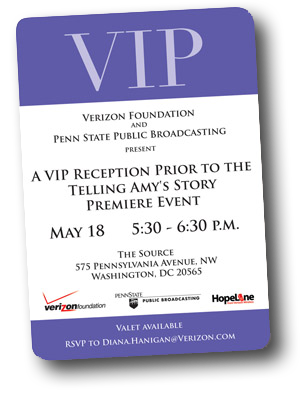You can leave this site quickly.
Learn more about Internet safety.
"Telling Amy's Story" Premiere

On November 8, 2001, Amy Homan McGee, a mother of two, was shot to death by her husband in their home in Pennsylvania. The murder was the final act of violence in a history of cruelty and abuse. She was thirty-three years old.
In 2010, with the help of the Verizon Foundation, Penn State Public Broadcasting created "Telling Amy's Story," a documentary chronicling the events leading up to Amy's death. Hosted by Joyful Heart Founder and President, Mariska Hargitay, the film uses interviews with Amy's friends and family, law enforcement officers, court personnel and co-workers at the Verizon store where she worked to examine the opportunities that may have changed the outcome of Amy's story. As Detective Fishel, the lead investigator on Amy's case and the film's narrator, says, we must look at "what we can do as a community to change the ending for another victim."
The film concludes with a discussion between Mariska and Sheryl Cates, CEO Emeritus of the National Domestic Violence Hotline, in which they begin to address of the many questions Amy's story raises: Why don't people talk about this issue more? Why is the shame with the victim and not the perpetrator? What can be done to bring change?
"Telling Amy's Story" premiered in Washington, DC at the Newseum on May 18. Mariska welcomed those in attendance and offered some sobering words:
In the time it will take us to participate in this event, over 700 women will be battered somewhere in the United States.
Into that tragic reality comes 'Telling Amy's Story,' a brave and important tool in acknowledging the truth about domestic violence, embracing survivors, and insisting on change. As part of a Public Service Media project, the film brings together the power and reach of public broadcasting with the engine of local engagement.
'Telling Amy's Story' has the power to heal, to educate, and-most importantly-to save lives.
Mariska also acknowledged Verizon's leadership on this issue. In the past three years, the foundation has given over $15 million dollars to non-profits assisting survivors of domestic violence.
I especially want to honor the courage and commitment of the Verizon Foundation for being one of the first companies to take a stand on this issue, and for making this film and this evening possible.
She then proudly introduced her husband and Joyful Heart Board Member, Peter Hermann, who emceed the event.
We know that no single TV show, or script, or film can shed all the light that's needed to break the cycle of violence. But what is in evidence in this room tonight, and what we can demonstrate as we leave here, is that all of us, together, can take steps toward illuminating this issue.
Associate Attorney General Thomas J. Perrelli pointed out in his remarks that domestic violence touches every community, including the military, teens, college students, the disabled, or the elderly, and thus requires our continued attention and far-reaching vigilance. He also highlighted the importance of educating youth as a means of breaking the cycle of violence.
Lynn Rosenthal, the first-ever White House Advisor on Violence Against Women, took the podium and announced that Obama administration has allotted and unprecedented $730 million dollars to fund services for victims of domestic violence. She joined Associate Attorney General Perrelli in calling attention to the pervasiveness of this problem, and reminded the audience of the many individuals who suffer in the darkness of fear and shame:
We are here tonight on behalf of those whose stories we know, and for those whose stories we don't.
The lights dimmed, and Amy's story filled the screen. As the events leading to the end of her life unfolded, people were finally listening.
Following the film was a panel discussion with Sheryl Cates; Melanie Doebler, Director of Public Engagement, Penn State Public Broadcasting; Detective Deirdri Rishel, Police Department of State College, PA; and Joe Myers, Creative Director, Penn State Public Broadcasting and the film's producer/director. The question and answer session between the audience and the panel was valuable not only in answering the audience's questions, but also in serving as a model of a community openly discussing and grappling with this difficult issue.
"Telling Amy's Story," will be distributed for broadcast on public television beginning June 1, 2010. Find out how to encourage your local public broadcasting station to broadcast the film here.
Amy's story deserves to be told. By telling it, we may not only bring future stories to a different conclusion, but prevent them from having to be written at all.






Your Voices